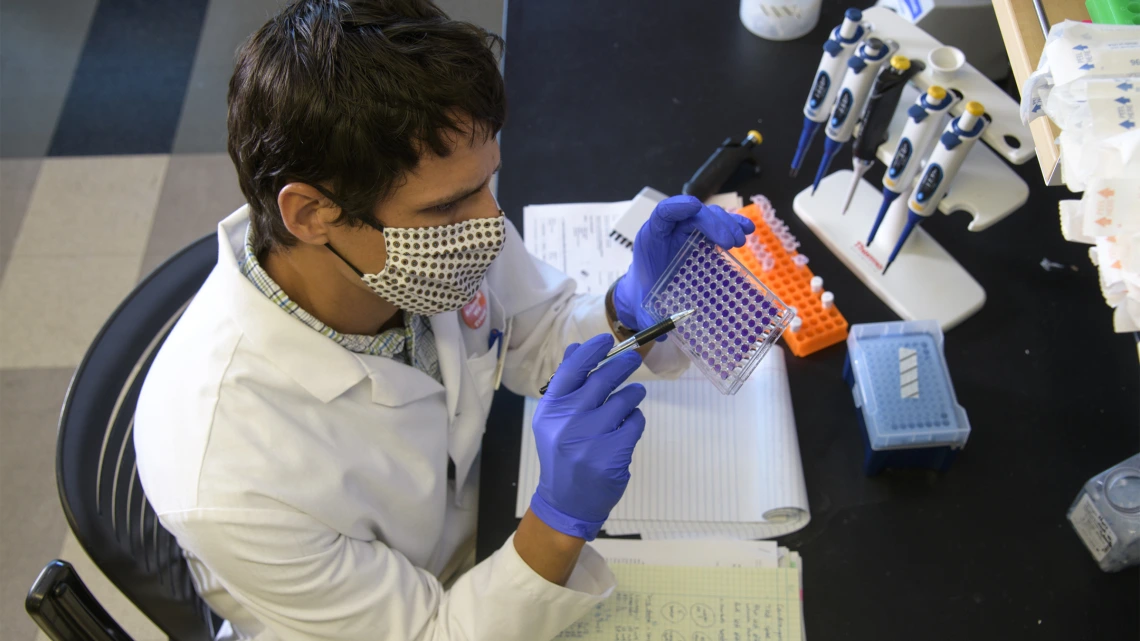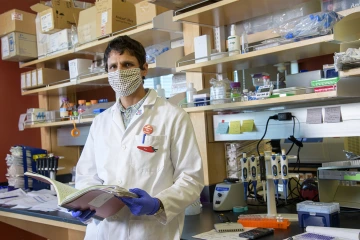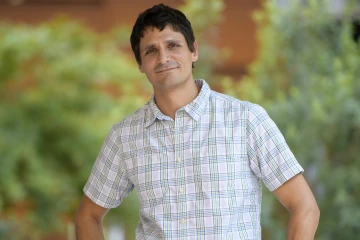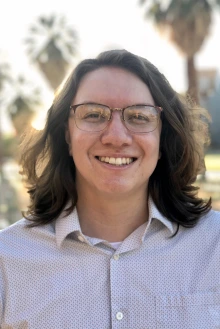Scientist Strives to Make Research Accessible to Undergrads
Dr. Sam Campos understands that making mistakes is part of learning, especially when it comes to introducing students to lab research for the first time.

Sam Campos, PhD, researches human papillomaviruses and, most recently, SARS-CoV-2, the virus that causes COVID-19.
At tier-one research institutions, research is often the exclusive domain of scientists, post-doctoral fellows and graduate students. But at the University of Arizona Health Sciences, Sam Campos, PhD, is passionate about giving undergraduate students the chance to experience research hands-on in his laboratory.

Dr. Campos keeps three or four undergraduates employed in his lab at all times and looks forward to welcoming them back when it is safe to do so.
“I think it's extremely important for undergraduates to get in the lab and actually learn what science is about,” said Dr. Campos, an associate professor in the College of Medicine – Tucson’s Department of Immunobiology and a member of the BIO5 Institute and UArizona Cancer Center. “I feel it's my duty to always have undergrads in the lab, because that's how I got where I am now. I was given that opportunity.”
Today, Dr. Campos is an expert in the field of human papillomavirus (HPV) research. He has published multiple papers and received multiple R01 grants from the National Institutes of Health to study HPV infection mechanisms. Most recently, he was awarded seed funding through the Technology and Research Initiative Fund to study infection mechanisms of the SARS-CoV-2 virus.
Learning a Love for Laboratories
As a first-year student at Virginia Tech, though, running a research lab wasn’t even on Dr. Campos’ radar. He enrolled as a biology major and took a variety of science classes to see what interested him the most. While he liked all of his coursework, he didn’t find his passion in the classroom – he found it in a lab.

Sam Campos, PhD
“I was just a young undergrad. They were teaching me PCR and letting me monkey around in the lab,” Dr. Campos said, admitting he did “hundreds of PCRs” and made plenty of mistakes. “They didn't have to let me in their lab to basically waste reagents and mess up. Looking back, I think about how much money I cost them, the time that they put in to train me, and the relatively small gains that were accomplished – I have a lot of gratitude for that.”
Providing Others the Same Opportunities
In the process of refining his lab skills, Dr. Campos found a passion for research that he says “sealed the deal” – he wanted to be a scientist and decided to pursue a PhD in biochemistry and cell biology at Rice University. As a UArizona faculty member, Dr. Campos has been passionate about offering undergraduate students the opportunity to learn about research in his own lab. “I feel it’s my duty,” he said.
One student, Eduardo Gamez spent two years working in the Campos Lab, where he was introduced to cellular and molecular biology. He started out learning basic techniques like cell culture, immunofluorescent microscopy and western blots, and advanced to designing and implementing his own experiments. Like his mentor, Gamez said his initial foray into research was fraught with mistakes.

Eduardo Gamez was a sophomore when he joined Dr. Campos’ lab, where he discovered a passion for microbiology and virology.
“When you're doing experiments with cells, they need to be cultured in the incubator the whole time, and only brought out briefly for manipulations. When I would do the experiments, I would sometimes leave the cells outside of the incubator for long periods of time, and I thought that that was OK,” Gamez said of one of his more memorable mistakes. “I did that for a few experiments, and one day Sam walked in and asked, ‘Why are these cells outside?’ I said, ‘Because I'm doing the experiment,’ and he said, ‘Well, we can’t use this data anymore.’ So, that was a big one. I made a lot of mistakes, but they were really patient and kind, so it gave me the motivation to stick with it and continue doing what, now, I love.”
Bringing the Experience Full Circle
Dr. Campos, whom Gamez describes as “super, super patient,” believes the process of making mistakes and learning from them in the lab creates resiliency in students. Additionally, undergraduate research can broaden students’ educational horizons as they figure out what they like and explore new opportunities.
That was certainly the case for Gamez, who graduated with a bachelor’s degree in physiology and opted to continue his education in graduate school based on the time he spent in Campos’ lab. Gamez is headed to the University of Hawaii at Manoa to pursue a master’s in tropical medicine, which focuses on infectious disease microbiology and immunology.
“The more I worked in Sam's lab, the more I realized I can fit in in this environment,” Gamez said. “I actually didn't know how much I love immunology and microbiology until I started working in this lab. Being a part of that little community really made me realize how much I want to continue with microbiology and continue to learn more about viruses, specifically. I was really lucky to join that lab. It was just an amazing experience and it really set me up for my future, for my career. So, I can't be more grateful.”

